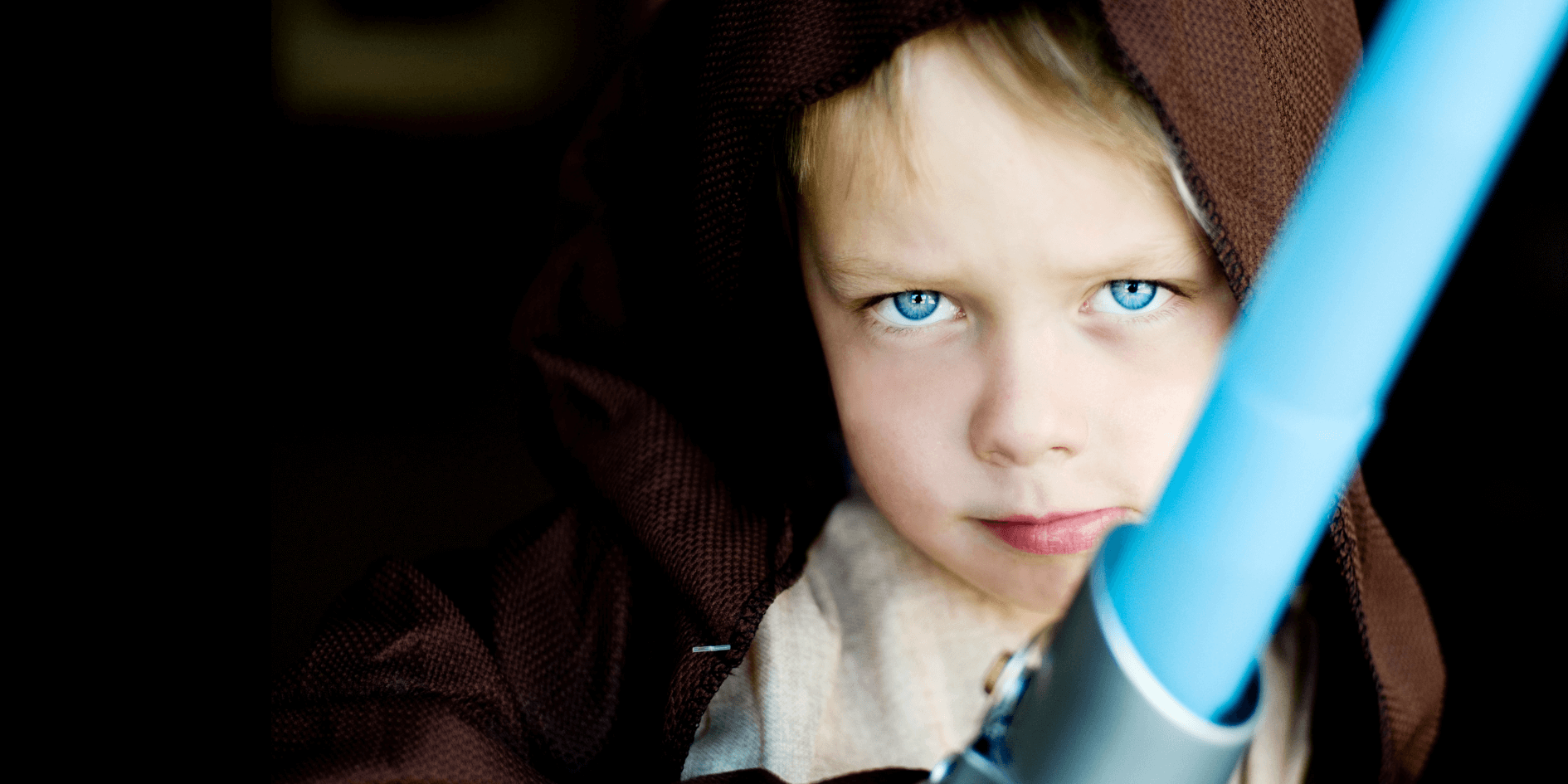There’s very few pieces of literature, cinema or music that maintain popularity throughout decades and possess the power to bring generations together. Star Wars most definitely falls into this category however, and 45 years since the release of ‘A New Hope’ the galaxy far, far away continues to delight fans young and old.
There’s many reasons for the enduring popularity of the saga, but perhaps one of the strongest elements we resonate with are the important lessons for life and ourselves embedded within each story. We can learn a lot about our own world from these far away ones, even about the way we parent.
No, we aren’t suggesting that you send your little one off to the Jedi Temple, or build them a Pod Racer, but there’s some very real lessons we can all take from the realm of the Jedi to better our lives – and our parenting skills.
1. Practice Mindfulness and Meditation
Anxiety and fear can be particularly difficult emotions for young children to navigate. Even as adults, many of us struggle to cope with them adequately, instead preferring the easier avoidance behavior. Anxiety manipulates our emotional responses to bring us into a position of fear and heightened stress. For some people it can become so difficult that it invades every part of their life. Without understanding where it stems from or how to cope with it, it can lead to a life of avoidance and increased risk of depression and other psychological issues.
“Always remember, your focus determines your reality.” – Qui-Gon Jinn
But a good Jedi never runs from a challenge and understands that controlling your emotions is the most important part of the battle, and they spend many years learning how to calm their minds, focus on their goals ahead and control their emotional responses. Throughout the Star Wars stories, we often visit Jedi while they are meditating, sometimes even in the middle of a heated duel we can see our heroes take a moment to refocus themselves. These are important habits to impart on our young people as they learn to understand the complicated world around (and within) them – it’s ok to feel anxious, but use those moments to breathe, calm yourself and come back to the important things you’re trying to achieve.
“Be mindful of your feelings.” -Mace Windu
“Confronting fear is the destiny of a Jedi.” – Luke Skywalker
2. Overcoming Failure
No matter how talented we are, nobody can be perfect at everything, all the time. In today’s world of social media and digital saturation, we’re comparing ourselves to others more than ever before. This can be particularly damaging to the brains of tweens and young adults as they begin to enter the age where we develop our sense of individuality. Often failures and embarrassing moments are no longer confined to privacy which can compound the sense of embarrassment and inadequacy that comes along with them. It’s important to teach our young Padawans that failure is nothing to be ashamed of, and is instead how we learn, evaluate ourselves and grow to be better people.
“The greatest teacher, failure is. Luke, we are what they grow beyond. That is the true burden of all masters.” – Yoda
It’s important to equip children with confidence not only to face fears, but process failures when they occur. Encouragement and support are essential parenting tools that will help children find the strength to try again. In his times of crises, Luke turned to Yoda for answers and encouragement, even in the later years of his life, and his Master Yoda always provided adequate reflections on Luke’s ruminations – even if it wasn’t what he wanted to hear. The relationship between Luke and Yoda throughout the saga is a wonderful example of how good guidance can lead us to learning our greatest lessons – not in our triumphs, but in our failures.
3. Feeling the Force
In the world of Star Wars, The Force is used as a metaphor to describe the common humanity that connects us all together. Whilst we can’t use it to move objects with our minds or communicate telepathically, we do all experience the same range of human emotions and learning to understand this is a key factor in helping kids to develop empathy. Understanding the ways in which they are connected to other people and the natural world around them teaches children to consider their own place in things, and the consequences of actions they take.
“You must feel the Force around you. Here. Between you, me, the tree, the rock, everywhere, yes.” –Yoda
Jedi are often able to feel or see each other’s presence even when they are vast distances apart, because they are connected by a common set of abilities, and utilize this sense of belonging to support each other through difficult times. Whilst mindfulness teaches us to look inside ourselves for strength, The Force highlights the importance of recognizing the plight of others, and that we are always stronger together than we are alone. In comparison, villains like Darth Vader don’t seek support in their times of trouble and are often shown brooding and internalizing their emotions, allowing them to dominate decision making processes. His internalized rage over the death of Padme is what tipped him over the edge to the dark side, and abandon the support of his Master Obi Wan forever.
“Remember, The Force will be with you. Always.” – Obi-Wan Kenobi
4. Facing the Dark Side
Now that we have discussed being mindful to overcome emotions like anxiety, building confidence by learning from mistakes, and developing empathy and kinship, it’s time to look at the other side of the Jedi world: The Dark Side. Throughout his teachings, Master Yoda imparts onto his Padawans that fear, anger and hate are what lead a Jedi to the Dark Side, however feeling those things is not what makes a Jedi “Dark” or “Evil”. Instead, what Yoda teaches us is that the suffering that comes with not understanding and processing these emotions is what causes someone to lose their connection to the “good” side of the force and instead turn to destructive forces like revenge, conflict and destruction. Yoda understands that emotions are a natural spectrum we all experience in relation to the events we go through in life, but that an avoidance of properly processing them can potentially lead to a lifetime of pain, solitude and unnecessary suffering.
“Fear is the path to the dark side…fear leads to anger…anger leads to hate…hate leads to suffering.” – Yoda
We can see personification of this in two story arcs in the Star Wars saga: Anakin Skywalker’s slow descent into becoming Darth Vader, and Kylo Ren’s struggle with The Dark Side after the death of his mother Leia. Anakin exhibited a strong connection with The Force as a child and was taken under the scholarship of Obi Wan Kenobi. However as Anakin grew into a young man, he began to struggle with his emotions while also developing a strong distaste for authority.
After the death of his mother in Attack of the Clones, Anakin makes his departure from the teachings of The Jedi by taking out revenge on her captors. Later he finds solace in the arms of his secret lover Padme Amidala, however her tragic death sees him give in to his rage and turn on his teacher Obi Wan.
“You’re asking me to be rational. I know that is something I cannot do.” – Anakin Skywalker
What can our children learn from Anakin? Exactly as Yoda says “anger leads to hate… Hate leads to suffering”. Anakin wasn’t born evil, he merely became the victim of his own inability to process his pain. We almost witness Kylo Ren walk the same path, however his Force connection to Rey sees him change his path and aid her in defeating Emperor Palpatine.
“I’m Being Torn Apart. I Want To Be Free Of This Pain.” – Kylo Ren
With all this in mind we need to equip those we care about with an adequate emotional toolbox and maintain strong connections to them.
What are your favourite lessons from The Jedi?













